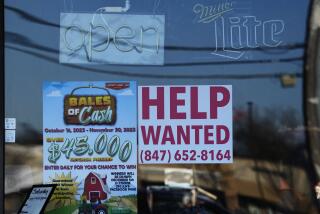U.S. unemployment rate falls to 6-year low of 5.8% on solid job growth
Solid job growth in October, the ninth straight month with more than 200,000 new jobs created, and a drop in the unemployment rate to a new six-year low of 5.8% showed that the labor market is strengthening.
But workers still aren’t seeing much improvement where it counts most — in their paychecks.
Wages grew slightly in October after two months with no gains, the Labor Department said Friday. Still, average hourly earnings during the last year have risen just 2%, a little more than the rate of inflation.
Economists said consumers don’t have enough spending money to boost the slow recovery from the Great Recession. And the sluggish pace of wage growth led to renewed calls for Congress to hike the federal minimum wage.
“Employers are still holding all the cards,” said Elise Gould, senior economist at the Economic Policy Institute, a think tank focused on the needs of low- and middle-income workers. “There are so many potential workers out there that employers don’t really need to pay higher wages.”
The pool of unemployed workers shrank last month as the U.S. notched a record 49th straight month of overall job gains with 214,000 net new jobs.
October’s figure was well off September’s upwardly revised figure of 256,000 and below economists’ expectations. The Labor Department also raised August’s original estimate, adding a total of 31,000 more positions in those two months.
The revisions pushed August’s total to 203,000, which meant that the best streak of job creation since the 1990s did not end in the summer, as was originally thought.
So far this year, job gains have averaged nearly 229,000 a month, compared with 194,000 last year.
“The economic indicators are going in the right direction,” President Obama said before a White House meeting with congressional leaders.
Investors reacted positively to the report. After dropping initially, the blue-chip Dow Jones industrial average gained 19.46 points, or 0.1%, to set a record close of 17,573.93.
Wall Street saw that October’s job growth was large enough to indicate the economy was improving and the wage gains were small enough to make it unlikely that Federal Reserve policymakers would raise interest rates soon.
“It gives the Fed a little more time to keep rates low and make sure the economy’s moving in the right direction,” said Benn Konner, a global investment specialist at J.P. Morgan Private Bank in Los Angeles.
The unemployment rate continued its steep drop, ticking down 0.1 percentage point to 5.8% last month, the lowest since July 2008. A year ago it was 7.2%.
Unlike some previous declines, October’s drop wasn’t driven by discouraged unemployed workers abandoning their job search.
The civilian labor force increased by 416,000 last month, the first growth since July. That led the labor force participation rate to inch up to 62.8% last month after hitting the lowest point since 1978 in September.
Still, there were nearly 9 million unemployed workers looking for jobs last month. Until that figure shrinks further, economists said, employers typically won’t increase wages to attract new hires or keep existing employees from leaving.
“There’s no pressure on employers to pay more,” said Douglas Holtz-Eakin, president of the conservative-leaning American Action Forum think tank. “They can hire people at existing wages.”
Wage growth is key to getting the economy growing faster, economists said. Higher pay would lead to greater spending, and consumer spending long has been the nation’s main economic driver.
“You won’t get the economy growing faster if wages simply keep at the same level as inflation,” said Bernard Baumohl, chief global economist at the Economic Outlook Group, who is optimistic that wage growth is picking up.
“What you need to see is real increases in purchasing power,” he said. “You want to see Americans earning more than just the cost of living.”
Some of the biggest increases in hiring last month came in lower-wage industries.
Restaurants and bars added 42,000 net new jobs, while retail shops added 27,000, the Labor Department said.
Some higher-paying sectors lagged in job growth. Manufacturers, for example, expanded their payrolls by 15,000 and construction firms by 12,000.
“While it’s welcome news that more people found work last month, wages remain stubbornly flat while costs continue to rise, squeezing middle-class families and putting the American dream further out of reach,” said House Speaker John Boehner (R-Ohio).
Republicans seized on economic discontent to fuel their big wins in Tuesday’s elections.
Obama has urged Congress to raise the minimum wage to $10.10 an hour from $7.25 to help struggling workers. Republican leaders oppose the move, arguing it would cost jobs by making employers reluctant to hire entry-level workers.
A Congressional Budget Office report found that a minimum-wage increase would cause the loss of 500,000 jobs, but also increase earnings for 16.5 million workers.
Public opinion polls have shown Americans support a minimum wage increase.
On Tuesday, voters in Alaska, Arkansas, Nebraska and South Dakota approved increases in the minimum wage in their states. Illinois voters approved a non-binding measure to raise the minimum wage there as well.
As of Aug. 1, California and 22 other states, as well as the District of Columbia, had minimum wages above the federal level, according to the National Conference of State Legislatures.
October’s jobs report is “a positive sign that the economy is growing, but it’s simply not enough for workers to feel the effects in their paychecks,” Gould said.
Other analysts said a minimum wage increase wasn’t a magic bullet.
“There’s no evidence that suggests that it’s a tide that lifts all boats,” said Mark Hamrick, Washington bureau chief of Bankrate.com, a financial information website.
“It helps those who are drawing the wage,” he said, “unless they have their job cut because the employer feels he can’t afford it.”







